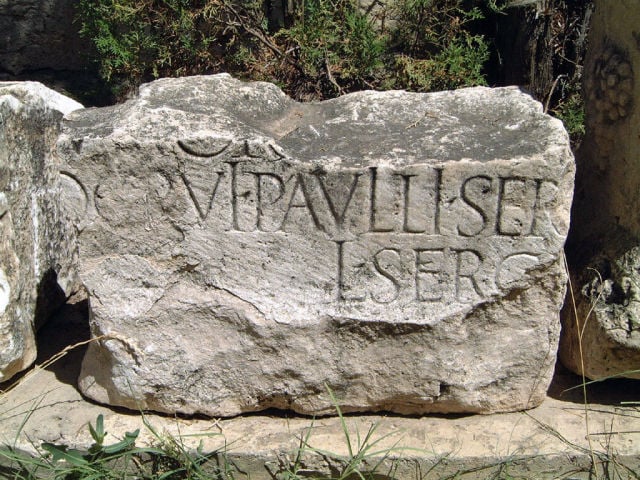
When I imagine the classroom of my dreams, I picture me seeding a free-flowing discussion with my well-crafted discussion questions and the occasional gem of theological wisdom. My students are all leaning forward in their seats, and I can see the wheels turning in their minds. They’re eager to ask deep questions and quick to draw connections between the snippets of emerging insight arising from the lively conversation.
Everyone contributes. The extroverts bring their energy to get the discussion moving. Toward the end of the class, the introvert in the back row, who has been absorbing everything with quiet intensity, shares a hunch that’s been building in her heart. As one, the class sits back to dwell in the mic drop moment of wisdom.
What actually happens can be quite different. About forty minutes into the class, I realize I’ve been speaking non-stop in my desire to get through the reams of content I’ve prepared. I can hear the pedagogy expert who came to the last professional development seminar for professors telling me that some student participation is well overdue. I pause at the end of the next paragraph. I look at the class with an optimistic raise of the eyebrows and ask, “Any questions? Comments?”
On a good day, one of the more switched-on students will have done the pre-class reading and will ask something really interesting about one of the articles referred to in a footnote that I referenced in my own research, and she and I will have a great discussion while the rest of the class keeps checking their social media feeds. More challenging are the questions that could be paraphrased as: “Can you tell me the answer to the question you’ve been teaching us for the past month, even though I haven’t been listening or done any of the reading?” More often than not, my question, “Any questions or comments?” is met with subtle shakes of the head accompanied by bemused smiles, or the kind of open-mouthed blank-stared gape that reminds me of a dead fish.
Generating a good theological discussion to prompt critical thinking is the white whale of classroom culture. We’re not just wanting to fill in the blanks of students’ theological knowledge: We want them to think deeply about what they’re learning. We want them to draw connections between different fields of thought. And we want them to see the fitting implications of these ideas for their life and ministry.
Table of contents
Is ignorance the problem?
Where there is ignorance, we want there to be light! But when there is ignorance, it can feel like there’s not a lot to work with. How many times have we ourselves been in a training seminar where the presenter gets everyone into small groups to “discuss together” the very thing that we’ve given time and money to learn about from the expert with the Sharpie at the front of the room! Discussion groups can often be little more than opportunities for the ill-informed to share their lack of information. It’s easy to see why professors resort to the monologue—at least there’s the possibility someone says something to dispel the ignorance!
But what if ignorance could actually be the key to encourage student participation and unlock critical thinking in a seminary classroom? And I’m not talking about the students’ ignorance, but the ignorance of the professor. My ignorance as a teacher is one of the keys to unlocking genuine conversations that can lead to deep learning.
To generate better classroom engagement, aim to ask questions that you don’t know the answer to.
I’m not suggesting going into a class without preparing your content! But when it comes to promoting engaging classroom interaction, asking genuine questions is more likely to generate genuine discussion. “Guess what I’m thinking about this topic?” is not a genuine question. It’s like when a professor asks a class, “What are the three most important ideas presented in the set reading?” What they really mean is, “Can you guess what I think are the three most important ideas presented in the set reading?”
When it comes to promoting engaging classroom interaction, asking genuine questions is more likely to generate genuine discussion.
Think about the last conversation you had with a friend. How many times did you ask them to guess what you were thinking about? Probably none! When you’re having a conversation with a friend, you likely want to know what they’re thinking about things. You’re not testing what they know about what you’re thinking.
This is what I mean by asking questions you don’t know the answers to.
5 discussion questions you don’t know the answer to
Here are five kinds of theological discussion questions that you, the learned professor, do not know the answer to.
1. “How are you feeling?” questions
Even before we start the class, I can gauge the energy in the room:
- “Give me a thumbs up/thumbs down, or any gradation in between.”
- “On a scale of 1 to 10, how interested are you feeling about what we’re going to be talking about today?” 1 means: “If this isn’t on the test there’s no way I’m paying any attention”; and 10 means: “I’m so excited about this topic, I haven’t slept for days!”
Asking students how they’re feeling about your class gives you valuable information about the emotional readiness in the room. Whether it’s your students’ physical energy or intellectual curiosity, overcoming your ignorance in that area can help your own expectations of what’s to come.
Giving every student a chance to contribute in a low-risk manner is an added advantage to this kind of question. Early participation fosters a culture of engagement that is associated with increased participation in group discussion.

2. “What stands out to you?” questions
- “What stands out to you from Psalm 13?”
- “What do you like most or least about this quotation from Catherine of Sienna?”
- “If you were interviewing the author of this article, what are the first three questions you’d like to ask them?”
Asking students what stands out to them in a particular text is a simple way to turn a “guess what’s in my head” question into something that is more likely to generate discussion.
If I ask, “What are the main ideas in Psalm 13?” students know I’ve got an answer written down in my notes. They are more likely to be wondering about what’s in my notes than about Psalm 13!
I know what stands out to me, but I’m ignorant of what stands out to my students. Perhaps my class is going to focus on the complaint in verse 1, and I discover my students are all struck by the confidence in verse 5. Maybe I’ll need to refocus my teaching to strengthen my students’ confidence in God’s love. Or maybe I could explore with them why the longing for God’s presence was not prominent for them.
Like a good conversation, I can better craft an engaging response when I know more of what’s going on in my students. I might choose to follow their interest, or I could give more attention to broadening their attention. Either way, I’ve overcome some of my ignorance of what my students are thinking.
Like a good conversation, I can better craft an engaging response when I know more of what’s going on for my students.
3. “Imagine what happens next?” questions
- “Write an imaginary three to five verses for the story of Zaccheus about the morning after Jesus had dinner at his place.”
- “Imagine you are members of the Church of Corinth who have just heard 1 Corinthians 8–10 read aloud in church. In groups of four, have two members adopt the personae of Gentile believers and the other two members adopt the personae of Jewish believers. Role play a conversation over morning tea after church.”
Questions drawing on the imagination are a kind of Bible fan fiction that enables students to experiment with the ideas in the text.1
While I know what happened in Luke 19:1–10, I’m ignorant of what happened next. I can imagine what might have happened, but by asking my students to use their own imaginations, I can gain a better understanding of what they’ve understood from the text.
When there isn’t one correct answer that I’m fishing for, students are free to explore the implications of the text for themselves.
4. “How would you express that?” questions
- “Write a limerick (or a haiku or a hashtag) that captures important elements of the doctrine of the Trinity.“
- “Rewrite the ideas in the first paragraph of the set reading using sentences of no more than twenty words, with each word containing no more than two syllables.”
Genuine discussion does not come from parroting back someone else’s ideas or fishing for the words that are in the lecturer’s mind. Asking students to re-express ideas tests their understanding and focuses their thinking on the meaning of what they are reading.
Paradoxically, constraints (a haiku, two-syllable words, etc.) enhance rather than limit creativity. Further, the humor that can arise from a clever limerick, or a failed attempt at a haiku, can add some welcome lightness and energy to the conversation.
5. “What are you going to do about this?” questions
Good discussion questions help students move from reflection to action. I don’t know what implications for ministry and mission are arising in my students’ heads from the ideas presented in class. Forward-focused, action-oriented questions overcome my ignorance.
- “What actions could you take to move forward?”
This carefully worded question comes from leadership coach Keith Webb.2 It is open-ended, inviting students to answer in full sentences. It initiates creativity by asking for multiple “actions” (plural), rather than just one option. It is non-pressured, asking for actions that they “could” take, without (yet) requiring them to commit. It invites a process: steps to “move forward” toward a goal, rather than the burden of solving everything all at once.
Embrace ignorance
Overcoming ignorance is an important aim in any classroom. But the ignorance needing to be overcome doesn’t only belong to neophyte learners.
No matter how expert I am in the topic I am teaching my students, I am ignorant of how they’re feeling about the topic. I am ignorant of what they’re thinking about the ideas we’re talking about. I am ignorant of how they would express these ideas in their own words. I am ignorant of where and how they might live out the implications of these ideas in their life and ministry. Asking questions that are designed to overcome my ignorance, questions I don’t know the answers to, is a useful key to better classroom engagement.
So I wonder, how do you feel about acknowledging your ignorance? What do you think of this approach to crafting discussion questions? How could you explain this to one of your colleagues? And what’s one thing you could do to implement these ideas in your next class?
More resources for the classroom
Everyday Christian Teaching: A Guide to Practicing Faith in the Classroom
Save $1.05 (5%)
Price: $19.94
-->Regular price: $20.99
From Research to Teaching: A Guide to Beginning Your Classroom Career
Save $0.80 (5%)
Price: $15.19
-->Regular price: $15.99
Against Worldview: Reimagining Christian Formation as Growth in Wisdom
Save $0.65 (5%)
Price: $12.34
-->Regular price: $12.99
Life Questions Every Student Asks: Faithful Responses to Common Issues
Save $0.80 (5%)
Price: $15.19
-->Regular price: $15.99
Related articles
- Is It Time to Retire “Christian Worldview” in Education? 7 Reconsiderations
- How to Ask Excellent Bible Study Discussion Questions
- How to Stay Christian in College: 3 Key Principles
- Should Christian Higher Ed Be Worried About AI?
- Exegetical Crises of Faith: 12 Tips for Struggling Students & Professors


 14 hours ago
2
14 hours ago
2










 English (US) ·
English (US) ·